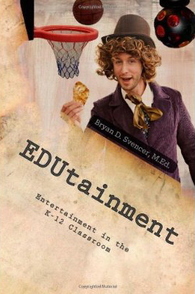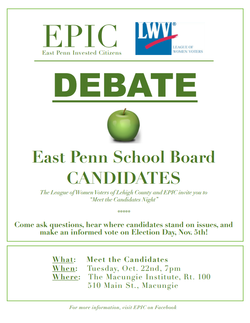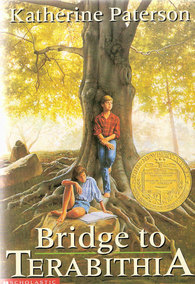 photo credit: svenwerk via photopin cc photo credit: svenwerk via photopin cc The Diary of Anne Frank is a brilliant, harrowing, and ultimately heart-wrenching account of a Jewish girl's attempt to escape the Nazis and the Holocaust during WWII. Last May, a parent in Michigan asked her district to eliminate this famous book from the curriculum, arguing that one short passage in the 320-page diary is too sexually explicit for students. This same logic was used last fall here in the East Penn District in demanding two books be removed from the long list of summer reading options given to parents and students (Prep and The Electric Kool-Aid Acid Test). One of my opponents called those who were uncomfortable with such censorship "hateful Marxists promoting an agenda designed to corrupt our children." I don't believe name calling is the proper way to address differences of opinion. But more importantly, I believe parents should be the primary decision-makers concerning what their children read, not school district administrators. In the case of our own district, the East Penn summer reading list explicitly states that teachers "encourage parents to read...book descriptions carefully with their children and assist them in selecting interesting, appropriate titles." We should empower parents to make informed decisions about books by noting potentially objectionable material in the descriptions on this list, not banning books from the list altogether. I have deep concerns about the slippery slope of censorship. The First Amendment is critical to our democracy precisely because it recognizes that there is no one, objective standard that speech can be judged against. If one filthy passage in a novel makes the whole work "objectionable," then how long does the passage have to be? What words or descriptions are "pornographic" and which are merely uncomfortable? And what about "objectionable" political ideas? Or religious ideas? Should we ban from the curriculum all those books that are objectionable to someone in any of these ways too? Katherine Paterson, author of the prize-winning (and much banned) book A Bridge to Terabithia perhaps puts it best when she writes: "All of us can think of a book...that we hope none of our children or any other children have taken off the shelf. But if I have the right to remove that book from the shelf - that work I abhor - then you also have exactly the same right and so does everyone else. And then we have no books left on the shelf for any of us." A quick glance at the American Library Association's list of most frequently banned books is a reminder of just how empty our shelves and reading lists might be if we try to eliminate everything to which anyone objects.
4 Comments
 I've written several times now about the need for innovative approaches to education that recognize and embrace the information revolution. There are certainly teachers that are meeting this challenge. There is a growing movement of educators adopting "flipped classrooms" in which traditional classroom lessons and traditional homework assignments are inverted: homework consists of watching lectures or reading explanations at home, and classroom time is spent practicing what was learned at home in problem-solving sessions. The inverted classroom approach takes advantage of technological innovations such as widespread internet access and online video, makes increased use of teacher expertise in helping students work through material at their own pace, and more closely mirrors the new kinds of job skills students will need once they graduate. Of course, this isn't the only approach that can work. Right here in our own district Brian Svencer-- a 4th grade teacher at Lincoln Elementary-- has written a book about his high-energy approach to the classroom that engages students by integrating traditional curricular content into new media and forms of entertainment students already enjoy and are comfortable with. He will be discussing his approach on The Breaking Free Show this Monday (October 21st) at 1pm if you want to learn more (or call into the show: 919-518-9773).
Both of these examples of teaching innovation rely on the creativity and professionalism of teachers. Ultimately, no one "method" will be right for every teacher, or every student, or every classroom. What we need most is highly intelligent, motivated teachers who can adapt and excel in a changing educational environment. And as much as I am grateful for the many excellent teachers we have in our district (my own children have had several), I also know we can do even better. Dr. Mehta, at Harvard's Graduate School of Education, has commented on the ways in which improved teacher training and professionalization will translate into improved public education (full disclosure: Dr. Mehta and I were colleagues in graduate school). He notes that teachers in some of the world's best public school systems-- in places like Japan, Finland, and Canada-- are drawn primarily from the top third of their college classes. By contrast, most teachers in the United States come from the bottom 60 percent. And there is no rigorous professional licensing system for teachers in this country akin to that in fields like medicine, law, engineering, and architecture. Transforming public education to meet the demands of the information revolution will depend, in part, on our ability to transform teacher education, as well as our willingness to treat teachers (and have teachers respond) as the full professionals that they are. We need to raise the bar.  photo credit: porschelinn via photopin cc photo credit: porschelinn via photopin cc As anyone following the fiasco in Washington DC knows, bitter partisanship is costing taxpayers money, damaging the economy, bringing hardship to ordinary Americans, and threatening the full faith and credit of our country. Yet even amidst this partisan meltdown, some local candidates for office here in the Lehigh Valley continue to lean on empty partisan talking points and political ideology rather than engage with the practical needs of the local community. Why? Studies Show: Partisanship Clouds Judgment There has been a flurry of recent scientific studies that help explain this puzzle. They point out truth and good judgment are the first casualties of partisanship. For example, a Princeton University study showed that people tend to give the partisan answer to factual questions about the economy instead of the correct answer, even when they know the truth. Perhaps even most interesting, a recent experiment compared how self-described Democrats and Republicans interpreted new facts under conditions of low and high partisan polarization. The results of the experiment show that people use new knowledge in forming their views when partisan polarization is low, but ignore new facts and simply repeat their party’s slogans when partisan polarization is high. Worse, high polarization made people more confident in their (less grounded) views! Put simply, partisanship reduces our ability to learn new facts and make the best possible choices for ourselves and our community. Dare I say it? Yes, partisanship can make us stupid! At a moment in our nation's history when partisan polarization is greater than at any time in more than a century, we need to break out of partisan bickering wherever we can. Keep Partisan Politics Out of Community Government And the place to start is our local community. We need energetic and dynamic people we can trust to make careful decisions based on accurate facts and the needs of the community. We need consensus builders whose first instinct is to solicit the knowledge, advice, and experience of others, rather than making snap judgments based on the tired rhetoric of national politicians and wild-eyed talk show hosts. The political spectacle in Washington is at once frightening, maddening, and comic. It represents vicious partisanship gone awry. And it hurts all of us. But we don't have to run our own local communities in the same way. We all will have the opportunity to prove this on November 5th.  photo credit: ATENCION: via photopin cc photo credit: ATENCION: via photopin cc As I go door to door, concern over the new Common Core standards is one of the most frequent issues raised by the people I meet. I've learned a great deal these last few months about Common Core by talking to community members, asking questions of educational professionals, and research into its history on my own. I am a skeptic of Common Core standards based on what I've learned. There is no research demonstrating the standards will improve the quality of education in our classrooms. And they are likely to contribute to the ongoing problem of relying on high-stakes standardized testing in the schools. I may write more about these problems in a future post. But to be honest, right now I am even more concerned about the misunderstandings of Common Core that are coming to dominate discussion of it. There are plenty of good reasons to be skeptical of Common Core, so there is no need to perpetuate false ones. Three myths in particular stand out to me: Myth #1: Common Core is a federal mandate This is perhaps the most common misunderstanding. Common Core standards originated in efforts by state governors, not the federal government. They are not, nor ever have been, an initiative of the federal government. The standards are also completely voluntary; no state has been forced to adopt them. They are therefore in no way a "mandate". Common Core represents neither a federal takeover of local education nor a replacement of the (federal) No Child Left Behind Act. Sadly, this myth has grown because some people use it deliberately to score political points. They know that "federal mandate" is a buzzword that is good at generating community opposition, so they apply this label to the Common Core not because it is true but because it is useful to pushing a particular political ideology. Myth #2: Common Core is a new curriculum Common Core is a set of standards, not a curriculum. It consists of a list of knowledge and skills that students should have at different grade levels. Local school districts are still free to choose their own textbooks and reading lists. Teachers remain free to teach the knowledge and skills contained in the standards in any way they see fit. To be sure, any set of standards is going to influence what materials are used and how teachers teach. I had to learn more about the difference between "standards" and "curriculum" myself when I began learning more about the Common Core. I'm glad I did, as any intelligent discussion of their place in the schools requires an understanding of this distinction. Myth #3: Common Core covers everything taught in school Common Core standards have been developed for only two subjects: math and reading. They do not address science, social studies, or any other topics covered in the curriculum. Whatever the strengths or weaknesses of the Common Core, they are limited to just two subjects. We need accurate facts to make good decisions for our schools Surveys show that most people don't know very much about Common Core. A national poll this past summer showed that less than one third of Americans had even heard of the Common Core. Worse, many who had heard of the standards held factually incorrect views of how they were created and where they came from. The lack of knowledge about the Common Core makes it even easier for these three common myths to persist. One of the core platforms in my campaign is that we-- as a community-- need to make decisions about our schools using objective and accurate facts. The current debate over Common Core is a great example of how this is currently not the case. Whether you are a Common Core skeptic or supporter, I think we should all agree that the debate over the standards should be based on a clear-eyed understanding of what Common Core actually is, and not myths and political slogans about it. To learn more about Common Core, start by going straight to the source: The Common Core Standards Initiative. You might also find critical columns published in the New York Times and the Washington Post this past summer useful. Or, for something more local, this opinion piece by George Ball, chairman of the Bucks County-based Burpee seed company.  The League of Women Voters and the East Penn Invested Citizens (EPIC) have teamed up to sponsor a special school board candidate's night where you can hear from all the candidates about their qualifications and vision for our community's school district. This important forum will be held on Tuesday, October 22nd, at 7pm in the Macungie Institute (510 Main St. in Macungie). I hope you will join me at this event to learn more about education and the direction of our school district. Unfortunately, the previously announced EPIC presentation on class size scheduled for 10/17 has been cancelled. More information here. I'll be working hard over the coming month to introduce myself to as many people in the community as possible. No matter how much time I devote to going door-to-door, however, I won't be able to meet everyone personally. That's why I've put together the short video below to introduce myself "virtually" to others. The clip is a little goofy, but it lets people know why I'm running and some of the issues that are important. Please forward it along to those who have not met me before! |
Details
Categories
All
Archives
December 2017
|


